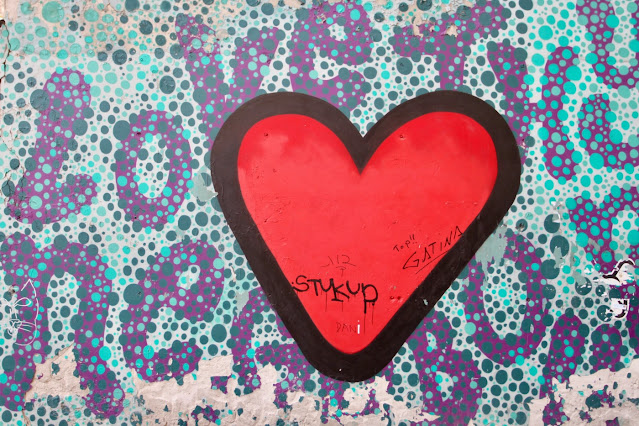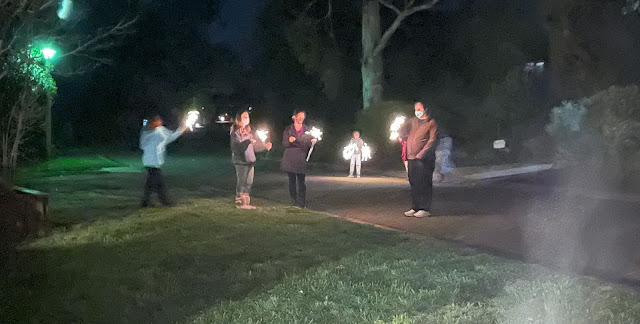 |
| -Image Street Art by Luke Embden, Budapest |
There’s just one more thing I want to mention about the
Canberra trip because it’s worth emulating, no matter where you live.
I was very surprised when almost as soon we'd heard that we were going to have to isolate, a cardboard container with three lattes, two hot chocolates and a stack of pink iced doughnuts inside appeared on the doorstep. This miracle repeated itself several times during the ensuing week. Sometimes there’d also be a basket of groceries, a big casserole or a pot of soup, all without anyone seeming to lift a finger. On Easter Saturday, when the children were supposed to have taken part in a street Easter Egg Hunt, the Easter Bunny had come right up to the house and left them all around their garden. Sometimes we saw the good fairies dropping things off and sometimes we didn’t, but I did notice that except for the coffee -bringer who turned out to be a close neighbour, they were all different people.
Normally Canberrans are rather reserved and you can live next door to people for years and never actually meet. Almost everyone is from somewhere else and without their usual network of family and friends, so I was very curious as to how this had come about. My son explained that it had been happening since Australia's devastating bushfires three years ago.
When the smoke from the bushfires had barely cleared and Covid began, he still had some masks left over from the bushfires, so he’d started a group chat for the people on his street asking if they needed masks or if anyone needed shopping done. One thing led to another and people have been helping each other out ever
since. It had proven especially useful during the pandemic – first with the
handing out of masks and hand sanitiser and then with food supplies during lockdown.That way only one person needed to go out.
This in turn led to a number of other activities such as street parties and Midwinter Feasts. There has also been a constant exchange of tools and ingredients. If someone down the street runs out of onions for a curry and calls for one over the network, they'll very likely end up with a kilo of them. People also look after each other’s houses and pets while they are away. During lockdown, children’s birthday parties were celebrated by neighbours going out on onto their driveways with sparklers. When the big ice storm hit Canberra a few months ago, neighbours got together to remove fallen trees and son went around taping up people’s broken windows and skylights with Gaffer tape and tarps.
The storm caused so much damage, that people in other parts of the district are still waiting to have tree branches cleared away by the council, so a bit of initiative on the part of neighbours has proven very useful. The street has now featured on radio three or four times and it’s been called "the friendliest cul de sac in Canberra."
 |
| The neighbours made sure that the children didn't miss out when the Easter Bunny came |
The first thing listeners always asked was, “How can I get something like that started in my neighbourhood?’ Son says that it starts with a conversation.
“When you see someone in your street just talk to them. In one case, we already welcomed the new owners when they won the auction for a house in our street. As to the ones who leave, they have been talking about starting an alumni group."
I ask him if he’s ever had a bad experience. Apparently not so far. He says, “ I’m a firm believer in context. I tend to trust people by default and if you publicly extend trust to people, they tend to return it in kind.”
“Apart from practical help such as we’ve just seen, what do you think is the best thing about your neighbourhood group?” I ask.
“Well, when I see the kids all playing together and running up the street, I think of our own childhood and how free we were. All the parents keep a bit of an eye on them, but they also get to relax. You don’t have to worry about them all the time, nor drive them all over town for play dates. There’s always someone nearby and you’re not far from home if anything goes wrong, but it lets children be a bit more independent of adults."
 |
| Families out in the street to celebrate the birthday of a child in isolation |
The beauty of this network is that it’s small and intimate and doesn’t make any demands, but if you have sufficient willing hands, there are larger networks too. I’ll talk about those in the next post.
Comments